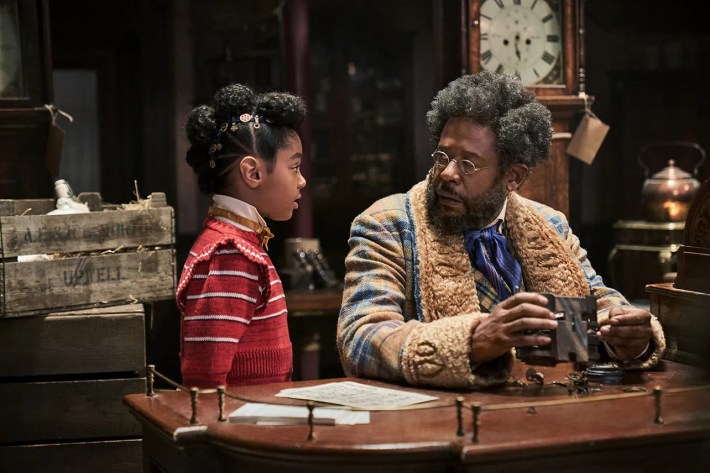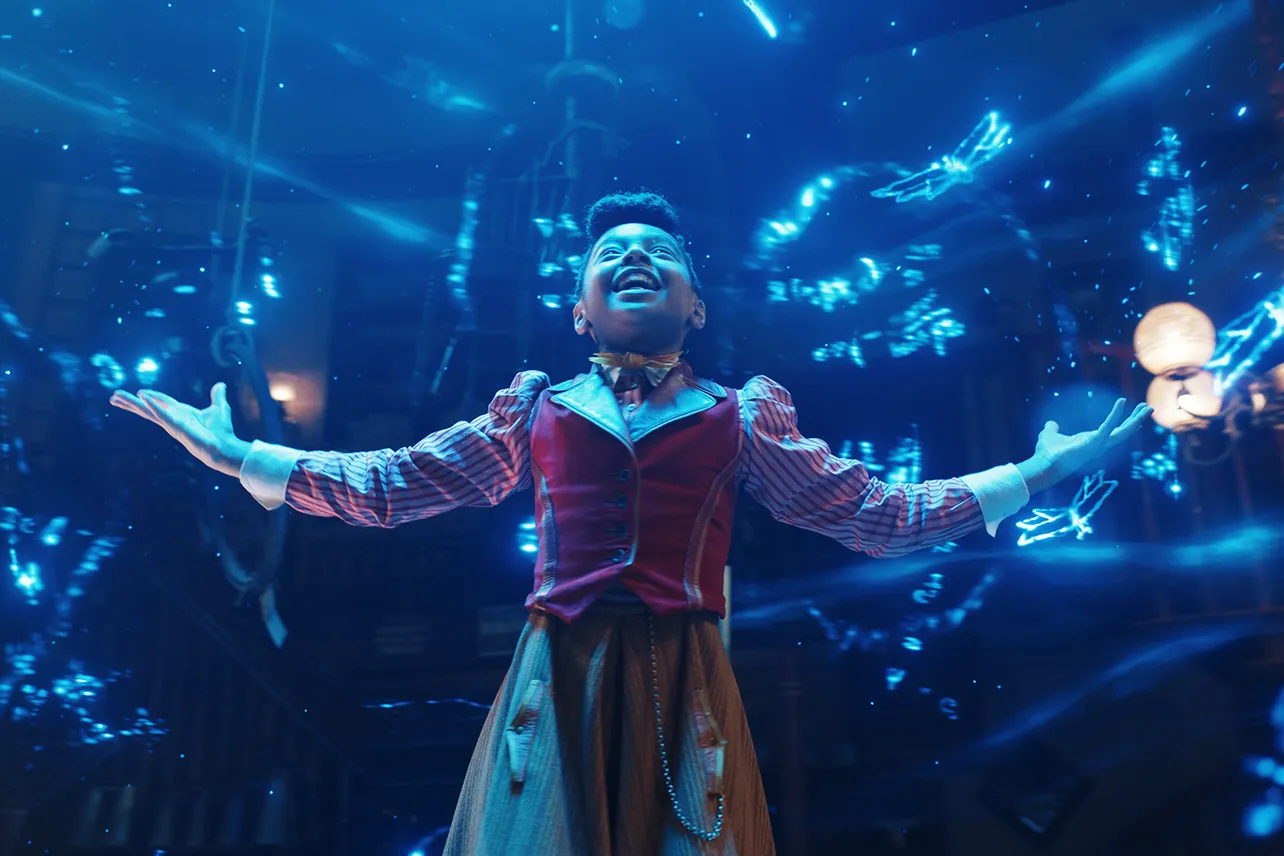Originally released in 2020 on Netflix, Jingle Jangle: A Christmas Journey is a movie that tells the story of toymaker and inventor Jeronicus Jangle (Forest Whitaker) who, one day, receives a life-changing item for his newest toy: a serum that will bring it to life. Before he can properly bask in this success, Jeronicus's book of inventions is stolen by his assistant Gustafson (Keegan-Michael Key). Not long afterward, Jeronicus' wife suddenly dies.
Despondent, broken-spirited, and unable to invent like he used to, Jeronicus pushes away his daughter Jessica (Diaana Babnicova as young Jessica, Anika Noni Rose as adult Jessica), who eventually grows up and leaves to live her own life. Thirty years pass, and Jeronicus is now a pawnbroker and a shadow of his former self. His shop, "Jangles and Things," is in danger of being seized by the bank unless he can deliver a revolutionary invention. When Jeronicus' granddaughter, Journey (Madalen Mills), appears in his life, she becomes the key to Jeronicus recovering all that he has lost.
Since I first watched it in 2021, this film has become one of my annual Christmas traditions. It is magical from the very first scene, which opens with a Black girl and boy being read Jeronicus' story by their grandmother. The Black girl can literally see the fireplace flames dancing, but her brother cannot and teases her for this. Their grandmother notices and must tell them the story of Jeronicus Jangle for a special reason: The girl is more magical than she knows; she just needs a little help realizing it. She reminded me of my younger self, filled with self-doubt after being teased for my unusual interests.
Another reason this film is magical is the way the fantasy steampunk world of Jeronicus Jangle is presented through his toy shop and those close to him. In fact, the opening musical sequence, "This Day," sung by a young Jeronicus (Justin Cornwell) and his wife (Sharon Rose) is so anthemic it makes you not only believe in Jeronicus' potential but also makes you want to hone your own.
We see him and his wife gallivant through the toyshop, which buzzes with activity, and into the street. There, Jeronicus gives his awestruck daughter Jessica his beautiful necklace. We later see him do what I call "magic math," drawing formulas for inventions that appear in the air as glowing numbers and letters.
The joy of the opening sequence makes Jeronicus' losses more emotional. Thirty years later, the bright, magical world Jeronicus inhabited is now bleak, whereas that of his misguided and thieving assistant Gustafson is greener in more ways than one — not only is his own toy shop draped in an envious shade of green, but Gustafson himself is dressed head to toe in an emerald top hat, coattails, and cane. His stolen extravagance is flaunted in the jazzy musical number "Magic Man G," even as he is desperately trying to keep his longtime status as "Toymaker of the Year." The song oozes extravagance and pomp, especially with the fabulous costumes designed by Michael Wilkinson.
According to an interview with Variety, Wilkinson fused Victorian-era jackets and dresses with colorful West African textiles. The result is wonderful. Another of my favorite outfits is Journey's, Jeronicus' granddaughter and Jessica's daughter. Her purple jacket and tie combined with a dress and screws adorning her hair are a lovely way to show off her imaginative personality.
Journey's outfit and personality are in striking juxtaposition with her grandfather Jeronicus. He looks frumpy, with his grey sweater vest-and unkempt hair. Yet Journey and secondary characters, like postwoman Ms. Johnston (Lisa Davina Phillip), still see his vibrant untapped potential, exemplified in Ms. Johnston's fabulous gospel-tinged musical number "Miles and Miles" (dubbed by Broadway singer Marisha Wallace).
Jeronicus's journey to recovering what he has lost resonated with me deeply as someone who lost a parent in 2012 right before Christmas, and as someone who temporarily lost the magic to create. In 2015, I did a bittersweet poetry reading in college where I was applauded by my peers but harshly critiqued by a family member. After that, I started to doubt my ability to write. My confidence as a poet gradually diminished until I stopped writing entirely in 2019. I wouldn't write or publish any poetry again until 2022, when I discovered video game and pop culture poetry and became inspired to write my own.

In order for Jeronicus to recover what he has lost, he must learn to believe in his own magic and become open to love again. This might seem hokey, but it is life-changing and empowering when you are mired in grief and depression for years after unexpectedly losing a loved one and your creative passion. Grief is not linear, and this is reflected in Jeronicus' character arc as he takes one step forward and two steps back, pulling Journey in but later lashing out at her before singing the mournful "Over and Over." "I love to remember, but it hurts to remember," Forest Whitaker croons. "When did I leave the me who used to believe?"
Thankfully, Journey gradually works her magic in multiple ways. Her steadfast belief in her own imaginative power is demonstrated in the soaring solo "Square Root of Possible." She corrects a miscalculation in her grandfather's formula, which becomes the key to completing the invention that will save his shop from closing. Through these actions and others, she helps her grandfather remember his own magic with the childlike wonder and joy — evident in a jubilant snowball-fight scene set to Ghanaian singer Bisa Kdei's "Grandpa Me Nie'".
If there is one criticism that I have of this movie, it is that there isn't enough screentime given to Anika Noni Rose, who plays Jeronicus's adult daughter Jessica. For those not familiar, Anika Noni Rose is best known for voicing Disney's first Black princess, Tiana, in the 2009 animated film The Princess and The Frog. Her vocal range as a singer is fantastic, and the fact that she hasn't been in more movie musicals is a crime.
She delivers a soulful and passionate performance alongside Forest Whitaker in the song "Make It Work" toward the end of the film, but that's it. There was a solo song, "With Love," but it was cut from the final version of the movie. The scene can be viewed on YouTube, but it would've made the reconciliation between Jessica and Jeronicus more poignant if it had been left in the film.
An earlier fantasy film that came close to Jingle Jangle's powerful cinematography, music, and racially diverse casting is 1997's Cinderella. Starring singer and actress Brandy and the late, great Whitney Houston, the film kickstarted my love of musicals as a child and made me feel like the impossible was possible. Now a new generation has Jingle Jangle to help them believe in their own magic.
But even as an adult, this film resonated with me. As Mrs. Johnston wisely tells Jeronicus, "The magic isn't in just what you've lost; it is in what you still have." Jingle Jangle has helped me acknowledge my grief and remember that my potential isn't defined by my losses. I can still be magical, as long as I believe.






